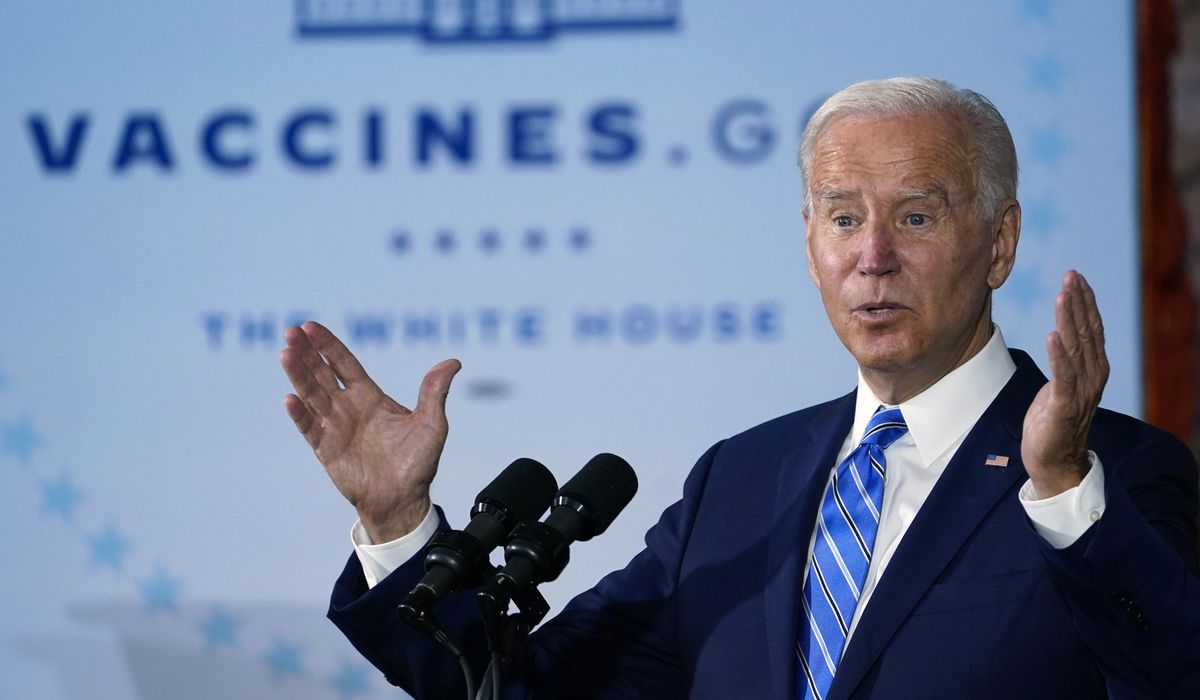
Conservative groups on Thursday teed up arguments for the Supreme Court to strike down President Biden’s COVID-19 vaccine mandates for private companies and pointed to polling that shows narrow support for a Republican effort to eliminate the Occupational Safety and Health Administration’s requirement for large employers.
On Friday, the justices began hearing from plaintiffs who say OSHA overstepped its authority with an emergency temporary workplace standard that would force employers with 100 or more workers to determine which employees are unvaccinated and require those employees to submit to weekly testing for coronavirus infection.
“No constitutional or legal authority is given to the federal government to issue this type of mandate, and the Supreme Court should reiterate this fact quickly and without ambiguity,” Heritage Foundation President Kevin Roberts said. “When Heritage filed our lawsuit against this unconstitutional mandate, we expected the fight would ultimately end up at the U.S. Supreme Court. That day is here. This is a pivotal moment for our judicial system. The outcome of this case will have consequences far beyond a mandate over the COVID vaccine.”
The Washington-based think tank is supported by a majority of congressional Republicans, who have filed amicus briefs urging the Supreme Court to strike down the rule.
Republican lawmakers generally support the COVID-19 vaccine but say Americans should not be forced to choose between inoculation and employment.
The White House says vaccination would make workers’ lives easier but notes that the rule doesn’t require shots as a condition of employment. The weekly testing requirement is designed to enhance safety, officials said.
The Senate has passed a resolution that would nullify the OSHA rule under the Congressional Review Act. It had the support of all Republicans and two Democrats: Sen. Joe Manchin III of West Virginia and Sen. Jon Tester of Montana.
The resolution faces a tougher test in the Democratic-led House, which hasn’t voted on the measure. Although Mr. Biden would never sign the resolution, Republicans see a key political opening ahead of the midterm elections.
The Convention of States Action, working with Trafalgar Group pollsters, found that 51.1% of voters, including nearly a third of Democrats, support the effort to strike down Mr. Biden’s rule on large businesses. Another 40.6% oppose the effort, and 8.3% aren’t sure.
“Big majorities support the effort, even a third of voters in Biden’s own party,” said Mark Meckler, president of Convention of States Action. “This is the defining issue of the 2022 election cycle. Elected officials will be held accountable for their position. They cannot hide from this.”
Justices on Friday will also hear arguments related to a Biden mandate that requires millions of health care workers to be vaccinated against COVID-19.
Under a rule published by the Centers for Medicare & Medicaid Services on Nov. 5, a wide range of health care providers that receive federal Medicare or Medicaid funding would have to require workers to get the first dose of a vaccine by Dec. 6 and be fully vaccinated by Jan. 4. The rule would affect more than 17 million workers in about 76,000 health care facilities and home health care providers.
The rule was challenged in four lawsuits filed by Republican-led states, mostly in groups. Florida and Texas mounted their own challenges. The states argued that there were no grounds for an emergency rule, that CMS had no clear legal authority to issue the mandate and that the rule infringes on states’ responsibilities.
The rule is on hold nationally, but a Dec. 15 court decision might allow it to move ahead in about half the states. A Missouri-based federal judge issued a preliminary injunction on Nov. 29 barring enforcement in 10 states that originally sued. The next day, a Louisiana-based federal judge issued a preliminary injunction barring enforcement in the rest of the states. On Dec. 15, the injunction was narrowed to the 14 states suing in that court, and a federal judge in Texas granted an injunction that applies only to that state. The decisions could allow the mandate to be enforced in 25 states where no injunction is in place. The Centers for Medicare & Medicaid Services has not said whether it would pursue that path.
The Biden administration appealed the court rulings. On Dec. 16, the administration asked the Supreme Court to block the lower court orders that are keeping the mandate from going into effect in about half of the states.
The Justice Department asked the justices to allow the “urgently needed health and safety measure to take effect before the winter spike in COVID-19 cases worsens further.”
The case filed in Missouri is being considered by the St. Louis-based 8th U.S. Circuit Court of Appeals. The case filed in Louisiana, which was brought by a coalition of 14 states, is being considered by the 5th Circuit. So far, there has been no move to consolidate the challenges in a single court.
• This story is based in part on wire service reports.
For more information, visit The Washington Times COVID-19 resource page.








